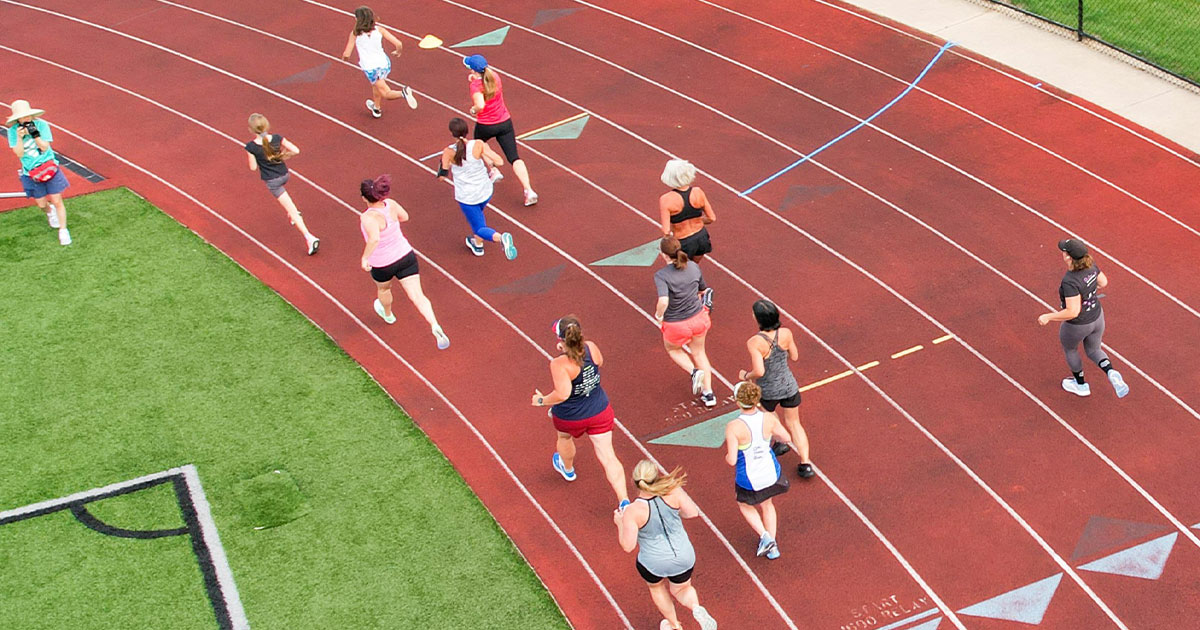I'm not exactly sure what came over me when I decided to sign up for the upcoming Detroit Free Press International Half Marathon this coming October. Perhaps it was the fact that I ran it exactly 10 years ago and figured, "why not do it again?" Or maybe it was the allure of having a goal to work towards over the next few months. Either way, my running routine and gear needed some refining and upgrading, as I fully knew the casual 5k I typically do with friends during the winter months wasn't exactly going to carry me through to the 13.1 finish line as a happy and healthy runner.
To learn more about what you really need to know when training for a race, I connected with Sonja Perakis, Executive Director of RunGR, a Grand Rapids running club made up of people with a wide range of skill levels and ages, all trying to better themselves and their community through running.
To start, if you're unsure what distance race you should sign up to run, Perakis suggests pondering this non-exhaustive list of questions:
1. What is your goal? "You might choose an event because it is a fun or convenient location or you might want to support a specific cause," Perakis said. "You might also choose an event because of the setting or how fast the course is."
2. What is your running experience and current fitness level? Be realistic with where you currently stand.
3. How much lead time do you have until the event? Meaning, examining how many weeks/months you have to prepare. Longer distances will likely require more prep time, especially if you're a beginner.
4. How much time can you dedicate to training per week? Training of course will include running, but should also include cross training, mobility work, etc.
Remember: It's OK to take it slow if you're just getting back into running.
"Many running-related injuries among adults who are new or returning to running come from doing too much or going too fast, too soon," Perakis said. "Running injuries are mostly preventable, but can feel like insurmountable obstacles to new runners who are just building up momentum in their new running habit. Listening to your body and being OK to take a few days off and/or consult a sports medicine doctor or physical therapist are critical to ensuring you make it to the start line on race day. As Olympian Alexi Pappas says, 'running is like pasta. better to be slightly undercooked.'"
Once you've settled on which race is right for you, Perakis says determining your training plan is especially critical, along with ensuring that it matches your race day goals.
"This is where having the guidance of an experienced coach can be super helpful," she said, adding that you should also figure out where you'll run for your training. "Be sure to find places where you feel safe and feel free reach out to local running groups or running stores for ideas about local running routes if you need support with that."
Of course, prioritizing comfort during your training will drastically improve the likelihood of you meeting your goals.
"You should make sure you have clothes and shoes that are comfortable and that make you feel good and confident," Perakis said. "Depending on the season, this might include lightweight tanks, shorts and visor, or thicker winter tights, a reflective vest and gloves."
If you're blister-prone, it's also important to get quality non-cotton running socks and supplies like Body Glide and Moleskin bandages to help prevent uncomfortable chaffing.
In addition to proper gear, Perakis emphasized the importance of getting the logistics of your event mapped out early in order to eliminate race day stress, especially if you're traveling out of town to run your race. This means planning when to pick up your race packet, booking any hotels, ensuring you're able to properly fuel your body the days before and morning of the race, etc.
When I asked if Perakis had any non-negotiables when it comes to the training process, she had some common sense yet helpful tips worth reinforcing, beginning with having a concrete plan, getting adequate sleep, nutrition and hydration.
"Be willing to take a few days off if you are tired or sore," she said, adding the importance of having a source of accountability. "Running groups, whether social or more structured training with a coach, are a great way to meet people with similar goals, build in some accountability, and enrich your training experience."
According to Perakis, maintaining consistency in your training can be made easier by having access to a gym or home treadmill, stationary bike and free weights for a variety of instances:
- When the weather or air quality is bad.
- If you need to train late or early in the morning.
- If you need a running break due to fatigue or injury.
Once you've finally wrapped up your training and are heading into your race, there are still some race day essentials that should be top of mind. Perakis' top three considerations?
"No. 1, nothing new, no. 2, nothing new, and no. 3, nothing new!" she said.
As cool as the idea may be to have shiny new gear of any kind for your race, be sure whatever you have is already road tested so you won't find yourself in the middle of your race regretting your choices rather than enjoying the ride you've trained for.
"Make sure you've practiced your race day routine and broken in your shoes ahead of time," Perakis said. "I like to wear handmade bracelets with little mantras on them, to help keep me focused on whatever my goal is for that specific day."
Remember to pack any mid-run fuel you'll need such as gels, chews and hydration (popular options include Gu, Honey Stinger, and Maurten).
"I also try to minimize stress the day or so before, especially if it is a longer event," Perakis said. "Maybe take a half day off work, if your schedule allows, or get all your gear around a few days early, to allow you to focus on fueling, nutrition and sleep."
If you find yourself doubting your ability or whether or not you can really do this, Perakis says to remember that the human body is amazing and women's bodies are especially resilient and adaptive. Of course, you should seek clearance to train from your doctor, if you have any health concerns.
"With time and planning, you can build your fitness up gradually to simply finish an event to start out, and then maybe think about some other goals, like a specific time or pace goal," she said. "Also remember what training looks like at 40 or 50 is going to look different than when you were in your teens. This is part of life. Enjoy it!"
Thankfully, resources abound for those in training.
"I love my Garmin and the Garmin Connect app. Runners World and Outside Run/Outside online has great resources," Perakis suggested, in addition to Oiselle, a women-owned brand with lots of resources about women's training and health.
"Running groups are also a great way to connect with others. Don't be afraid to join multiple groups, as they usually aren't mutually exclusive," Perakis said. "For example, I might join a more social group run for my easy workout days like Gazelle Urban Herd or Lyon Street Run Club, but prefer to join a group that offers coached workouts and water/Gatorade during training like RunGR for my harder/more intense days or for my long runs."
Perakis also mentions that RunGR has an app called RunGR, which can connect runners with several training tools, like pace estimators and links to local events.
One thing Perakis wants folks to remember while in training? Have fun.
"West Michigan has so many great opportunities to chase your running goals, whether you are looking to finish your first 5k or PR in the marathon," she said. "If you are ever in Grand Rapids, please come check out RunGR. We'd love to connect with you!"
Now, get out there and run!
Written by Sarah Suydam, Managing Editor for West Michigan Woman.
Photo Courtesy of RunGR.




